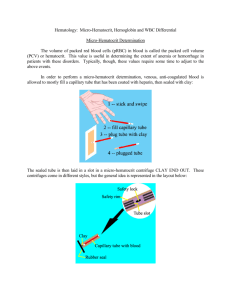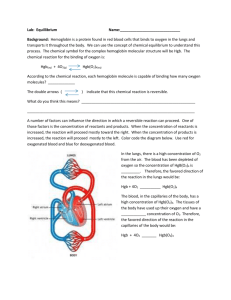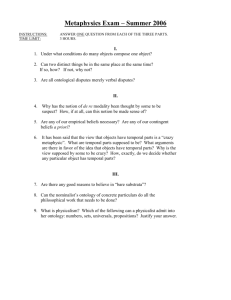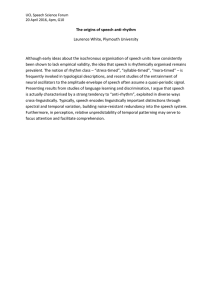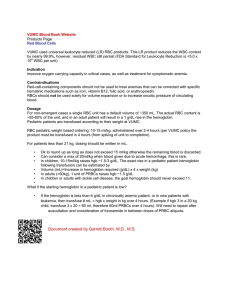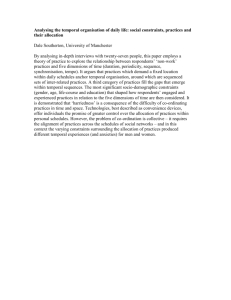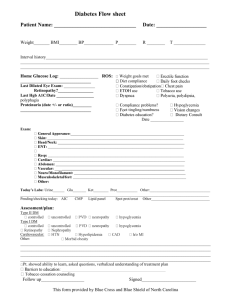A Visual Interface for Multivariate Temporal Data:
advertisement
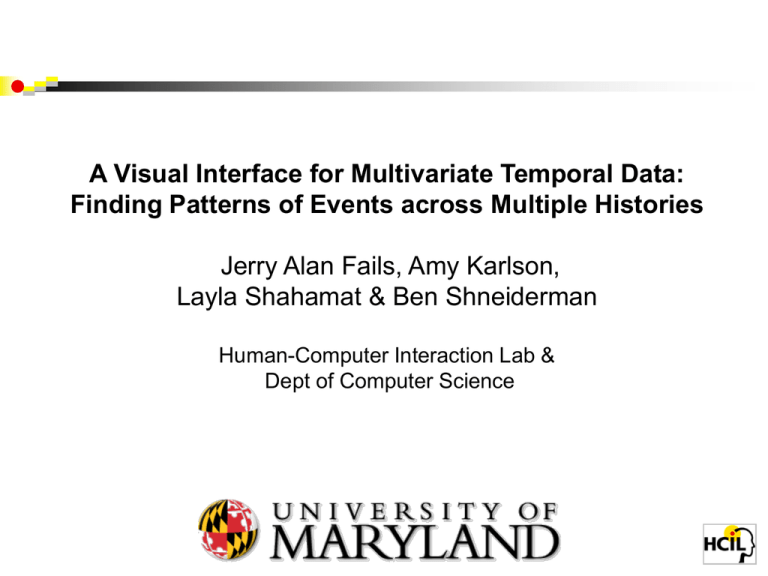
A Visual Interface for Multivariate Temporal Data: Finding Patterns of Events across Multiple Histories Jerry Alan Fails, Amy Karlson, Layla Shahamat & Ben Shneiderman Human-Computer Interaction Lab & Dept of Computer Science University of Maryland College Park, MD 20742 Time is Pervasive! • Stock market trades • Web log URLs • Medical histories • Crime/terror activities • Maintenance records Temporal Data: TimeSearcher 1.3 • • • Time series • Stocks • Weather • Genes User-specified patterns Rapid search Temporal Data: TimeSearcher 2.0 • • • Long Time series (>10,000 time points) Multiple variables Controlled precision in match (Linear, offset, noise, amplitude) www.cs.umd.edu/hcil/timesearcher KNAVE: Clinical Patient Data Distributed Knowledge-Based Abstraction, Visualization, and Exploration of Time-Oriented Clinical Data (Shahar, 1998) LifeLines: Visualizing Personal Histories (Plaisant et al., CHI 1997) Finding Patterns in Temporal Events • • Types of Time Data • Ordinal Values (e.g., TimeSearcher) • Categorical Events & Intervals (e.g., LifeLines) • Categorical Events Goal: Find Temporal Patterns Across Millions of Records • SQL makes it very difficult to specify • Temporal SQL helps only a little Comparison with SQL SELECT P.* FROM Person P, Event E1, Event E2, Event E3, Event E4 WHERE P.PID = E1.PID AND P.PID = E2.PID AND P.PID = E3.PID AND P.PID = E4.PID AND E1.type = “Medication” AND E1.class = “Anti Depressant” AND E1.name = “Remeron" AND E2.type = “Medication” AND E2.class = “Anti Depressant” AND E2.name = “Remeron" AND E3.type = “Medication” AND E3.class = “Anti Depressant” AND E3.name = “Remeron" AND E2.value > E1.value AND E3.value >= E2.value AND E2.date > E1.date AND E3.date >= E2.date AND E4.type = “Visit” AND E4.class = “Hospital” AND E4.name = “Emergency" AND E4.value = "Heart Attack" AND E4.date >= E3.date AND 180 <= (E4.date – E3.date) Temporal Patterns in Medical Histories • Reality • • Very large & complex data sets • Missing, uncertain, and redundant data Tasks • Alerts concerning patient status • Decision support for treatment decisions • Clinical research on outcomes • Identify groups of patients for testing Temporal Patterns in Medical Histories • Reality • • Very large & complex data sets • Missing, uncertain, and redundant data Tasks • Alerts concerning patient status • Decision support for treatment decisions • Clinical research on outcomes • Identify groups of patients for testing Finding Patterns in Temporal Events • Imagine simple table P-ID Age Gender Date Source Attribute Value 174 73 M 5/6/2005 Test WBC 12 183 67 F 5/7/2005 ER Symptom Chest Pain 183 67 F 5/8/2005 Test WBC 23 174 73 M 5/12/2005 Medication Tylenol 325mg 259 71 F 5/12/2005 Test HDL 55 174 73 M 5/14/2005 Test WBC 19 Finding Patterns in Temporal Events • Imagine an even simpler table P-ID Age Gender Date Source Attribute Value 174 73 M 5/6/2005 Test WBC 12 183 67 F 5/7/2005 Test WBC 14 183 67 F 5/8/2005 Test WBC 23 174 73 M 5/12/2005 Test RBC 4 259 71 F 5/12/2005 Test HDL 55 174 73 M 5/14/2005 Test WBC 19 Demo Simple Search: Event (E) • No TimeSpan Find patients who had cholesterol test above 200 Simple Search: Two Events (E) • No TimeSpan Find patients who had cholesterol test above 200 And White Blood Cell above 10 Events with Fixed Time (E-FT) • Fixed TimeSpan length Find patients who had cholesterol test above 200 And White Blood Cell above 10 exactly 1 day later 14 14 Events with Variable Time (E-VT) • Variable TimeSpan length Find patients who had cholesterol test above 200 And White Blood Cell above 10 with 0 to 7 days later Trends with Event Sets E*WC • • Sets of Events behave as single Events Adds Window and Cardinality constraints Find patients with 3-8 WBC tests at 15-29, during a 6 day period PatternFinder Interface This pattern specificies any patient who received increasing dosages of Remeron followed by a heart attack within 180 days (along with the events constituting the temporal pattern match). Result set visualization: ball & chain The results show five matches of people who received increasing dosages of Remeron followed by a heart attack within 180 days. Current work Work with Washington Hospital Center - Developing taxonomy of simple queries - Designing interface to fit in Azyxxi - Implementing simple searches Lab value [HGB] is high, then decreases >1.5 Lab value [Platelets] is high in a patient on heparin, then decreases > 20% Patient seen at ER & discharged, then returns to ER within 14 days Patient seen at ER & discharged, then returns to ER within 14 days & condition = [dead] Diverse Applications Maintenance log Replace battery, repair generator, repair starter,… Web log analyis Browse books, Checkout, Help, Leave Website Terror/criminal behavior Withdraw funds, buy weapon, purchase tickets… TV viewing (in 30 min segments) NBC, ABC, ABC, ABC,CBS, CBS Contributions: Queries for temporal events • Taxonomy of queries • Visual specification • Visualization of results: ball & chain view Contributions: Queries for temporal events • Taxonomy of queries • Visual specification • Visualization of results: ball & chain view • Reformulation of relational completeness • Facilitate medical treatment & research 24th Annual Symposium May 31-June 1, 2007 www.cs.umd.edu/hcil 6th Creativity & Cognition Conference • Washington, DC June 13-15, 2007 • Receptions at Nat’l Academy of Sciences & Corcoran Gallery of Art • Expand community of researchers • Bridge to software developers • Encourage art & science thinking http://www.cs.umd.edu/hcil/CC2007/ www.cs.umd.edu/hcil/CC2007 Taxonomy Table (1 of 2) Taxonomy Table (2 of 2) Current work Query 1: Fixed patient values and fixed dates Low HGB followed by higher HGB after 9/22/2006 Filter1: HGB < 150 Date < 9/22/2006 Filter2: HGB > 160 Date > 9/22/2006 Query 2: Fixed patient values and relative dates Low HGB followed by higher HGB After the first reading. Filter1: HGB < 150 Date < 9/22/2006 Filter2: HGB > 160 Date AFTER F1.Date Query 3: Relative patient values and relative dates Low HGB followed by HGB 5 points higher, After the first reading. Filter1: HGB < 150 Date < 9/22/2006 Filter2: HGB > F1.HGB+5 Date AFTER F1.Date
